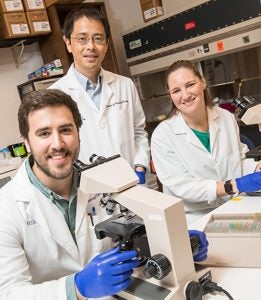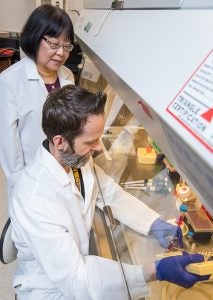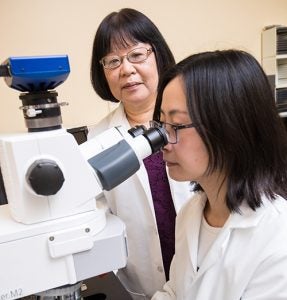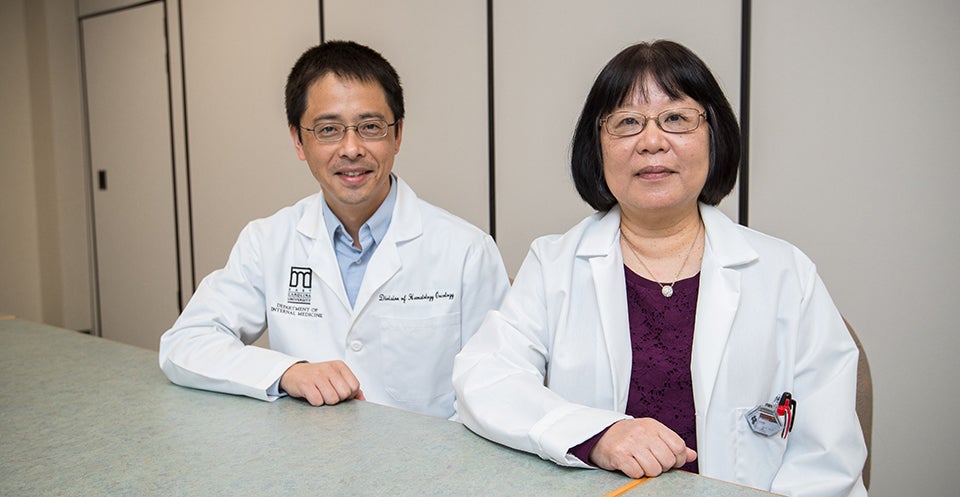INSIDE OUT
Grants fund intestinal research at ECU
The National Institutes of Health will fund two East Carolina University research projects aimed at improving health from the inside out by studying intestinal disease.
Dr. Li Yang, associate professor of internal medicine and adjunct professor of anatomy and cell biology at the Brody School of Medicine, was awarded a three-year, $436,300 grant to investigate the role of GPR4, a receptor thought to increase inflammatory responses related to bowel disease.
The study will attempt to determine how the GPR4 receptor affects intestinal inflammation and cancer formation, as well as assessing the therapeutic value of GPR4 inhibitors.
The project will provide new insights into the development of inflammatory bowel disease, Yang said. “Moreover, knowledge gained from this study can be potentially extrapolated to other types of inflammatory disorders and inflammation-related cancers.”

Edward Sanderlin (left) and Elizabeth Krewson are among the students who will participate in Yang’s project.
It will also provide research experience for the students training in Yang’s laboratory, including doctoral students Edward Sanderlin and Elizabeth Krewson. Additional graduate and undergraduate students will also participate throughout the project. Dr. Kvin Lertpiriyapong in the Department of Comparative Medicine is a co-investigator and Dr. Heng Hong in the Department of Pathology is a collaborator of this project.
Meanwhile, Dr. Yan-Hua Chen, associate professor of anatomy and cell biology, will be researching the role of claudin-7, a protein that helps form the intestinal mucus barriers that are vital for nutrition absorption and the body’s defense against pathogens.

NIH grants help fund research experience for students like Rodney Tatum, now a research technician in Chen’s lab.
The project, funded by a three-year, $435,916 NIH grant, will determine whether and how the absence of claudin-7 causes intestinal inflammation. It is a continuation of Chen’s laboratory research focusing on claudin protein functions in health and human diseases.
“Claudin proteins play a critical role in the epithelial tissue barrier. Injuries to this epithelial barrier will have serious consequences for human health, which can lead to a number of diseases such as inflammatory bowel disease, kidney disease and hearing loss,” Chen said. “Therefore, understanding claudin functions is an important focus of research in academia as well as in the pharmaceutical industry.”
Chen’s research has already led to the discovery that deletion of claudin-7 leads to intestinal bleeding, ulcers and inflammation, which resemble inflammatory bowel disease (IBD) symptoms. Tiaosi Xing, a doctoral student in Chen’s lab, will be conducting a study to investigate the relationship between claudin proteins and intestinal stem cell functions.

Doctoral student Tiaosi Xing and Chen are researching the role of claudin proteins in inflammatory bowel disease.
The Crohn’s and Colitis Foundation of America estimates that 1.6 million Americans suffer from IBD, and a 2016 survey conducted by the Centers for Disease Control and Prevention suggests the number may be more than 3 million. Patients with IBD can have abdominal pain, diarrhea and an increased risk of colorectal cancer, adversely affecting their health and quality of life.
Both Li and Chen’s projects could improve the understanding of intestinal function and lead to new therapies for the treatment of intestinal disorders.
